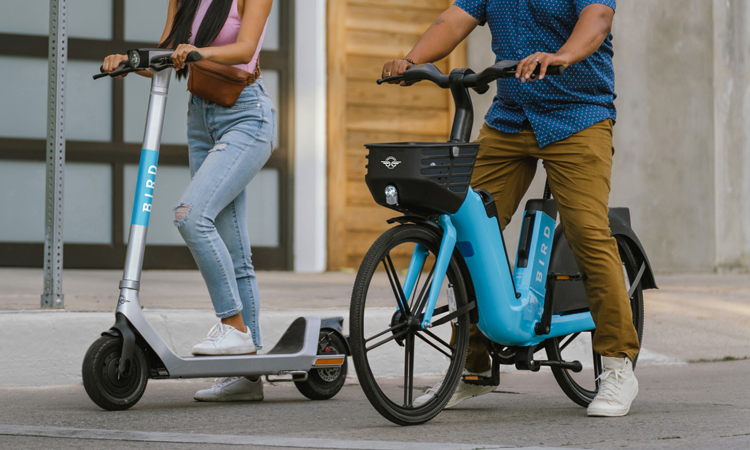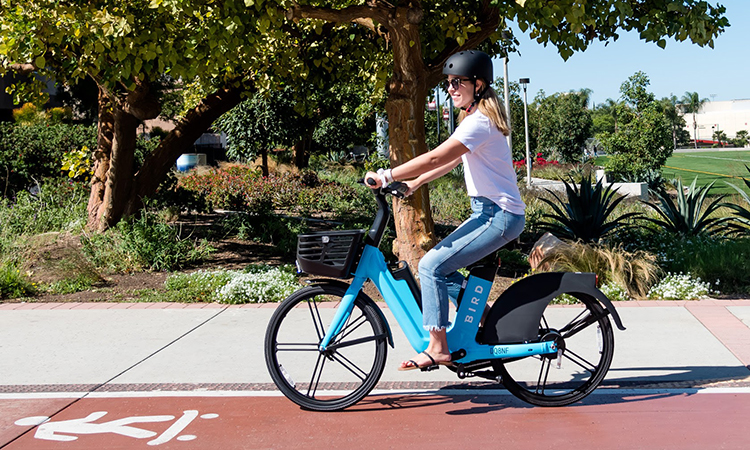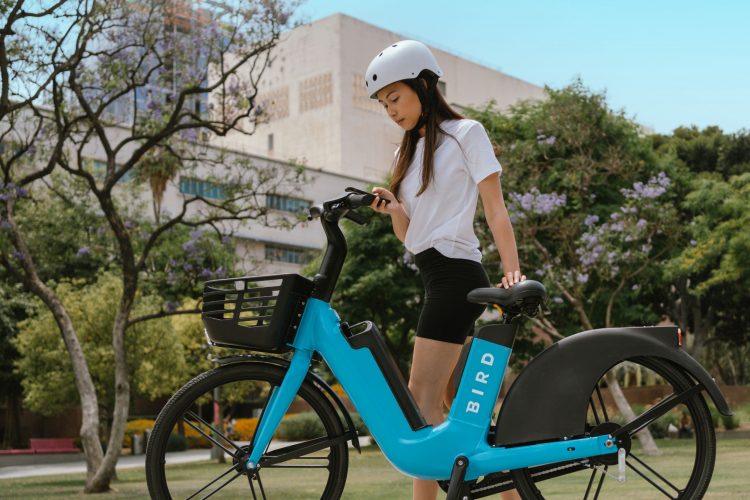How e-mobility is driving a foundational shift in transportation
- Like
- Digg
- Del
- Tumblr
- VKontakte
- Buffer
- Love This
- Odnoklassniki
- Meneame
- Blogger
- Amazon
- Yahoo Mail
- Gmail
- AOL
- Newsvine
- HackerNews
- Evernote
- MySpace
- Mail.ru
- Viadeo
- Line
- Comments
- Yummly
- SMS
- Viber
- Telegram
- Subscribe
- Skype
- Facebook Messenger
- Kakao
- LiveJournal
- Yammer
- Edgar
- Fintel
- Mix
- Instapaper
- Copy Link
Posted: 6 January 2022 | Charlotte Bailey - Bird | No comments yet
Charlotte Bailey, Regional Manager – North Europe at Bird, discusses the micro-mobility provider’s efforts to develop accessible and versatile mobility solutions that tackle climate change whilst offering a viable alternative to the private car.


We may be used to wake-up calls when it comes to our collective impact on the planet’s health, but the latest Intergovernmental Panel on Climate Change (IPCC) report1 reads like a storm siren, listing off the compounding effects of climate change that will drastically impact our quality of life if we don’t drastically reduce our carbon emissions right away.
At Bird, we aim to do our part for our environment and communities by tackling one of the largest contributors of carbon emissions and a staple of daily suburban and urban life: transportation.
Transportation accounts for nearly a quarter2 of global energy-related carbon emissions, with passenger vehicles making up over 45 per cent of transportation-related emissions. It’s clear that we need to abandon the current reliance on fossil fuel-burning vehicles to reach net zero emissions. But, in getting rid of the status quo, you have to provide strong and feasible alternatives.
E-scooters: Sustainable micro-mobility
Part of Bird’s mission and purpose is to make cities more liveable”
Part of Bird’s mission and purpose is to make cities more liveable. The first solution that we developed for that purpose was the shared e-scooter, as its small size and one- to three-mile range (1.6km to 4.8km) made it perfect for replacing the short commuter car trips that are responsible for so much air pollution and street congestion.
Since they’re powered by an electric battery instead of a fuel-burning engine, e-scooters have a significantly lower carbon footprint than that made by gas-powered cars. By collaborating with cities and riders in more than 300 cities around the world, we’ve developed the groundwork for an operational model that can provide safe, fun and eco-friendly electric transportation to cities big and small.
Enter the e-bike
Earlier this year, we took those learnings and expanded our micro-mobility offerings with the introduction and launch of our shared electric bike and bikeshare platform3, giving our partner cities another clean transportation option for their visitors and residents. One that provides an eco-friendly option for trips that are more than three miles. But we didn’t stop there: Bird believes so strongly in micro-mobility’s role in transitioning people out of gas-powered or ICE cars and into micro-electric vehicles, that we decided to release another e-bike4 of our own, this time for consumer purchase. Dubbed the Bird Bike, this new vehicle allows riders to take all of the benefits of our shared bike home for their own personal enjoyment.


Credit: Bird
No ‘one size fits all’
Bird believes that providing a variety of electric transportation methods that can work in tandem with other low-carbon travel solutions, such as public transit, is the best way to meet people’s travel needs”
While we still consider e-scooters to be a key component of the clean transportation revolution and an essential part of our business, they are but one piece of the solution to reduce the number of miles travelled by cars. Rather than using a ‘one size fits all’ approach to decarbonisation, as a micro-electric vehicle company, Bird believes that providing a variety of electric transportation methods that can work in tandem with other low-carbon travel solutions, such as public transit, is the best way to meet people’s travel needs and encourage them to start using automotive alternatives.
Consumers are clearly hungry for eco-friendly options and e-bikes top the list, as it is estimated that Americans bought an e-bike every 52 seconds in 2020, and in the UK it is every three minutes. But what is it about e-bikes that specifically makes them so important for the average person – and critical for decarbonising transportation?
Familiarity
Bikes have been a staple of mobility for centuries and have played a large role in cultures around the world ever since. People are comfortable with seeing them travel on their roads, and many cities have designated bike lanes to accommodate cyclists. E-bikes look and feel almost exactly the same as a traditional bicycle, save for a small battery and motor, and they are able to be used for the same travel purposes.
Good old-fashioned cycling has long provided eco-conscious travellers with a carbon-free way of getting around. However, it isn’t for everyone, which leads to e-bikes’ next strength.
Accessibility
Since Bird’s e-bikes have a motor, you don’t need to be a super cyclist to get where you need to go. Bird Bike’s pedal assist lets the bike do the heavy lifting for riders, so there’s no need to worry about struggling up hills or running out of steam towards the end of trips. While traditional bikes often depend on their riders’ athleticism, e-bikes can allow riders of varying ability to enjoy the fun and eco-friendly highs of a bike ride. Furthermore, accessibility was top of mind for Bird’s in-house team of awardwinning engineers and designers as they developed our e-bike. Our bikeshare model and one of our consumer bike options use a step-through frame, making it easier to mount and dismount. Both bikes are equipped with onboard handlebar dash displays with ride metrics, and each one has a way to provide bike information aurally, either through voice prompts or Bluetooth/app connectivity.
A bike can have all of the perks in the world, but it is useless if people aren’t able to use it for their transportation needs.


Credit: Bird
Versatility
If providers and city officials are genuinely committed to implementing a viable market of micro-mobility options for consumers, then working together to provide a wide range of options that meet varied consumer needs will be key.
Bird is the first scooter operator to integrate directly with local shared bike and e-moped providers to advocate for multimodal electric transportation, because we’re focused on working with existing mobility services. That could take the form of partnering with local companies and bikeshare operators to display their vehicles in the Bird app. Bird shared e-bikes include custom local integrations that allow them to mesh seamlessly with their residing cities’ pre-established transportation networks. Our micro-mobility future depends on our ability to collaborate with one another in service of providing riders with the best possible bike share experience.
Moreover, e-bikes can go virtually anywhere that an average city bike can go, so riders can use them for travel in a wide range of environments, both urban and rural. Bird’s e-bikes have a typical range of around three to five miles (5km to 8km), meaning that they can easily be used in lieu of short car rides. Introducing bikeshare programmes in cities across the world amplifies the benefits of e-bikes exponentially, because it expands the world of eco-friendly micro-mobility options that are available to consumers – especially when cities already battle enormous hurdles in providing sustainable transit to residents.
Many cities and communities have been severely impacted by the COVID-19 pandemic, causing their limited resources to divert towards relief efforts and other ways to support their members. Unfortunately, these communities can’t afford to make clean transportation a top priority, despite reports like the IPCC’s proving the urgent need for decarbonisation efforts.
Shared, electric micro-mobility providers like Bird are vital for our climate future. We need to employ several transportation strategies to reach carbon neutrality in time to curtail the effects of climate change. Governments and micro-mobility providers have a responsibility to work together to provide a wide variety of transit options for consumers in order to mitigate transportation’s impact on the environment – and to ensure that we address everyone’s transit needs.
References
- https://www.ipcc.ch/assessment‑report/ar6/
- https://ourworldindata.org/co2‑emissions-from-transport
- https://www.bird.co/blog/bird-unveils-new-smart-bikeshare-program-designed-multimodal‑cities/
- https://www.bird.co/blog/new-electric-bird-bike-high-tech-eco-conscious-fun-you-can-own/


Related topics
Accessibility, Air Quality, Alternative Power, COVID-19, Mobility Services, Multimodality, Passenger Accessibility, Passenger Experience, Sustainable Urban Transport
Issue
Issue 3 2021
Related modes
Bikes & Scooters
Related organisations
Bird
Related people
Charlotte Bailey







